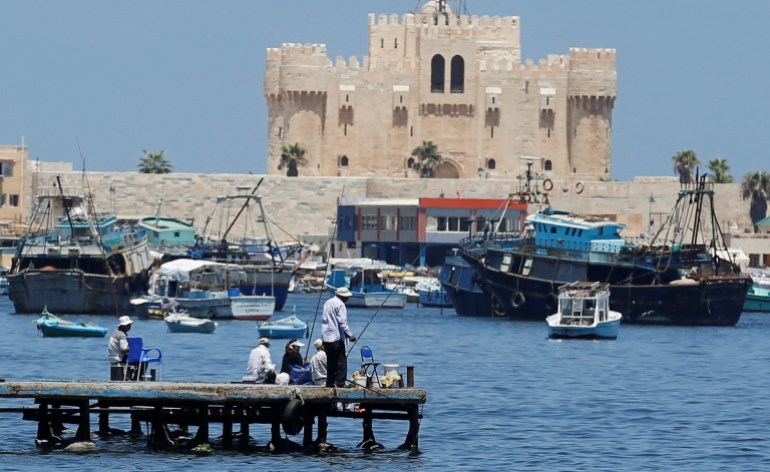
Alexander the Great never saw the city he imagined and named after himself nearly two and a half millennia ago. He was there to map it, reportedly using barleycorns, then leave and continue his conquests before arriving at the age of 32 in Babylon, more than 1,300 km (800 miles) from Alexandria. died.
He may have died, but his city did not.
Alexandria: The City That Changed the World, by the Egyptian-British academic Islam Issa, himself a member of the 100th generation of Alexandrians, is the biography of today’s second largest city in Egypt.
Alexandria, the Bride of the Sea, as it is now called in Arabic due to its Mediterranean location, is often ignored when discussing the world’s largest cities. Its importance – it was once a rival to Rome – is forgotten, but Issa takes the reader on a fascinating journey through the city’s history, its stories and its tragedies.
We meet the city’s rulers – including a brief period in the ninth century when it was controlled by pirates from Spain – and all the populations that have made the city their home, including Greeks, Egyptians, Jews, Arabs, Turks, French, British and many other Italians.
The founder of the same name
The book is not only the story of a city but, in its opening chapters, that of a man whose name has echoed through the centuries.
Alexandria symbolizes Alexander the Great. Both became epitomes of cosmopolitanism: Alexandria with its mixed population and identity, Alexander with its impact on three continents.
But while the man named numerous cities after himself (Kandahar in Afghanistan and Khujand in Tajikistan were originally named after him), today there is only one Alexandria.
Issa does an excellent job explaining the history and takes the time to tell the mythical and actual stories that made Alexandria the city it is today, the largest in the Mediterranean.
There are some fascinating links. According to legend, Helen was brought from Troy to what is now Alexandria. The Dome of the Rock in Jerusalem was modeled after a golden dome in the Egyptian city. Venice named its Basilica of St. Mark after a saint whose body was stolen from Alexandria by Venetian merchants. And Zionism, the Arab League and the 2011 Egyptian revolution all have ties to the city.
But in the beginning was Alexandria Pharos, an island off the coast of Egypt. A causeway was built to the mainland and widened by the natural, gradual deposition of silt, creating the geography we know today. The city’s growth following its founding by Alexander and the subsequent rule of the Ptolemaic dynasty (305-30 BC) led to a rapid influx of people from across the ancient Mediterranean world who were attracted to what the author as the “Alexandrian Dream,” a place of wide avenues, lush marble and vast parks, where the Pharos Lighthouse, an ancient wonder of the world, served as the ancient Statue of Liberty.
The modern idea of history is often one of struggle, but the book shows the wonders of the past, such as the Library of Alexandria, with its grand columns and sculptures and floor-to-ceiling cabinets full of papyrus scrolls – and possibly over a million books in all, dating back to the first century BCE. BC
The library itself was a state project that was planned when the city was founded. Rulers were willing to pay huge sums to acquire texts and sacrifice relationships with other states to keep them in Alexandria. The Alexandrian equivalent of customs confiscated books, not for the purpose of banning them, but to decide whether they should be confiscated for the library. Librarians were celebrities, and students back then were tasked with remembering their names.
Issa, one of the world’s leading scholars of Queen Cleopatra, devotes an insightful chapter to the great Alexandrian and a previous one to the forgotten Cleopatra – the most famous, after all, was the seventh of her name.
The queen, whose Racial identity has now created a controversy Issa, the subject of the book, was as cosmopolitan as Alexandria itself and spoke 11 languages. She was also the first of the Hellenistic Ptolemaic dynasty to become fluent in Egyptian.
Issa is often portrayed in the West as opportunistic and reliant on the arts of seduction, suggesting that Alexandrians see her differently. He explains how he grew up with celebratory stories. “She was a source of pride who, as I would learn, was an intellectual who debated powerful men,” Issa writes, before drawing on medieval Arabic sources that respectfully portray the queen and focus on her contributions to medicine and not focus on her appearance.

Local knowledge
The way Issa treats Cleopatra is a testament to the importance of the story of Alexandria being told by a local, someone from the city, at a time when the stories of the wider region are often told by be told to outsiders.
And Issa’s storytelling and expertise reflect the love he has for his city.
As we move away from Alexandria’s ancient past through the Arab conquest and then European invasions, we move into more modern times, and the advantage of having a native tell Alexandria’s story becomes increasingly important.
We learn more about Issa’s own family history in Alexandria, which steers the narrative away from the story of the rich and powerful, which naturally continues over the centuries, towards that of a simple person: a fisherman, a scrap dealer, a teacher.
As a child, Issa’s grandfather was a neighbor of Egyptian President Gamal Abdel Nasser in the working-class Bacos neighborhood of Alexandria, named after the ancient deity Bacchus. His parents remember the Six-Day War with Israel in 1967 and the death of a family member in the October War of 1973.
Alexandria itself has expanded from the original island and causeway to the island and now across the bay to deep south. Centuries of decline and rise, as well as natural disasters and rapid development, have transformed the city from the old broad avenues into, as the book describes it, a city of alleys where “everyone knows his neighbor’s news.” The unrest that has manifested itself throughout the rest of Egypt, partly due to the country’s economic difficulties but also to the repressive authorities, has reached its climax in Alexandria with the murder of a young man. Khaled saidby Egyptian police in 2010. A Facebook group calling for justice formed and eventually became one of the groups that organized the protest movement that would overthrow President Hosni Mubarak the following year.
The conflict contributed to the city’s identity, but also its history. Issa quotes a popular trap artist, Marwan Pablo, who sings, “I’m not from Egypt, I, I’m from Alexandriaaa.”
That doesn’t mean the locals aren’t proud Egyptians, they are. But they are also Alexandrians.
The city is no longer as cosmopolitan as it once was or as Alexander would have once imagined. The Europeans and Jews are mostly gone, but that wasn’t that long ago – Issa’s father still remembers the local pastry chef speaking to him in Egyptian Arabic when he gave him his order. Although he was of Greek origin, he was of Alexandrian origin.
The Greeks and other communities may have disappeared, but Issa points out that this does not mean the city’s culture is a monolith.
“In a single room, Muslims and Christians will sit together, a bearded man and a goth at adjacent tables, and in line a woman in a colorful beach dress stands in front of another with a black face veil,” writes Issa. “In Alexandria today, in this globalized city, you are free to adopt any cultural identity you want.”
Yes, it is an Arab and Muslim-majority city, but “today’s apparent hegemony lives in the shadow of a melting pot,” as the mixed heritage of its population proves. Issa ends the book by describing one of his own trips to Alexandria when he came from the sea, and how the city’s history still lives on, both in his imagination and in the scene unfolding before him.
And that’s not the end of the story. Issa points out that Alexandria’s current culture, the homogeneity that has accompanied the city’s postcolonial history, is about 75 years old, a tiny fraction of its 2,500-year history. “So who knows what will happen in two and a half millennia?”
Whatever the future holds, it will be difficult to tell her story in a more informed and loving way than Issa. His story is a tribute to Alexandria, a reservoir of knowledge about the city, and sets an example for those who want to tell the stories of the world’s great cities.






Recent Comments